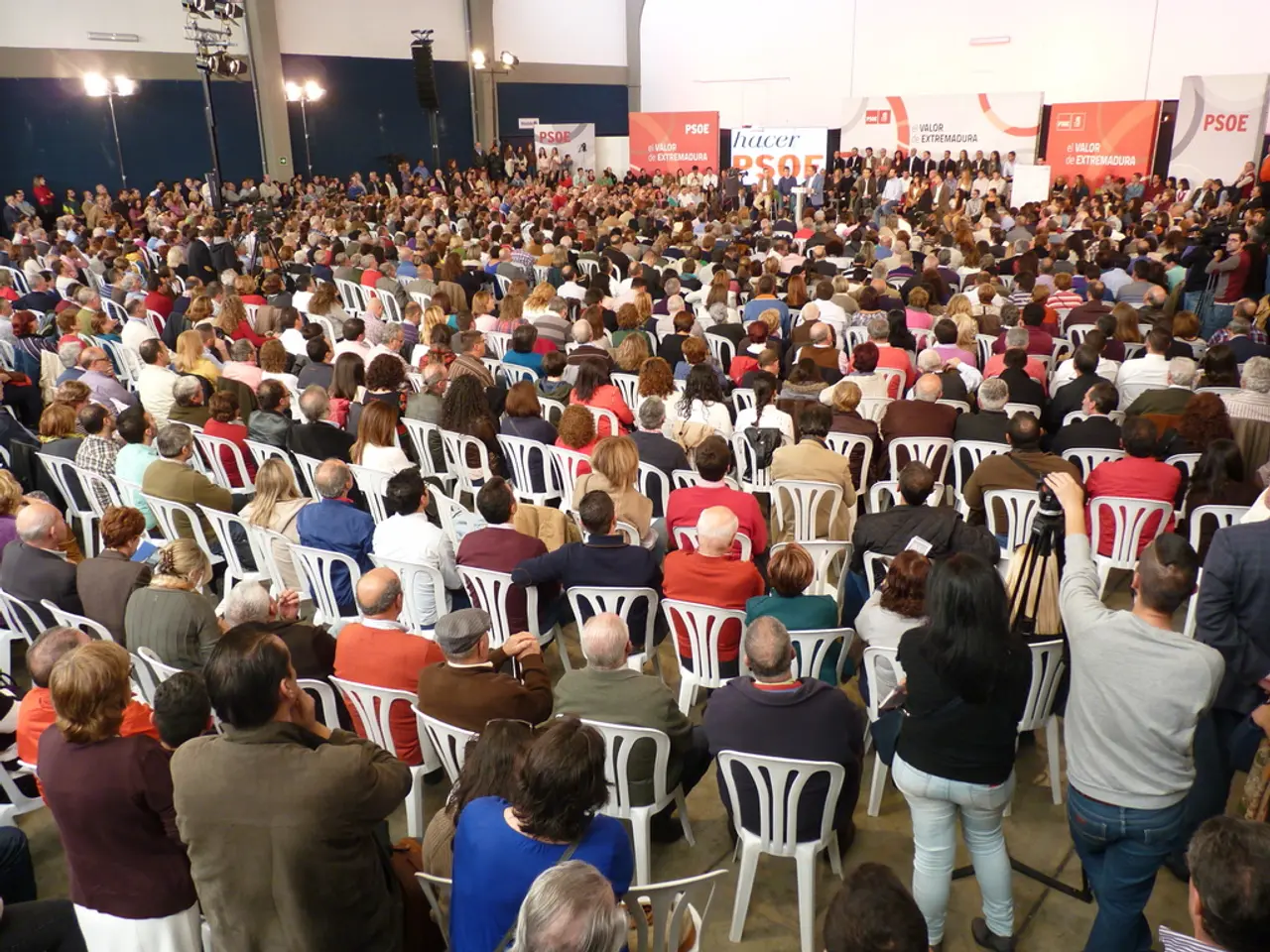EU pursues continued dialogues with Trump over trade disputes - Ongoing trade disagreement: The EU pursues additional talks with Trump over customs issues
In a move that has sent ripples through the global economy, President Trump announced new tariffs on European goods, set to take effect from August 1. The proposed 30% tariffs have been met with a cautious response from the European Union, as both sides continue negotiations in hopes of reaching a trade deal before the deadline.
The announcement follows a series of escalating tariff threats, with Trump initially proposing a 10% tariff for the EU, with higher tariffs for certain goods such as cars, steel, and aluminum products. However, medicines and pharmaceutical products were exempt from the initial tariffs [1]. Since then, Trump has published online letters to over 20 countries, outlining the tariff rates applicable to them from August 1 [2].
In response, the EU has prepared contingency measures and has made clear that it can impose counter-tariffs on US goods if these negotiations fail [2][3]. The EU has prepared a list of counter-tariffs on US products worth around 21 billion euros, though this has been suspended for the time being [2]. The current US tariffs affect European goods worth around 370 billion euros [2].
The EU trade ministers met in Brussels to discuss trade relations with the US, with European Commission President Ursula von der Leyen emphasizing the bloc’s preference for a negotiated solution [2]. Key European leaders, including Germany’s Friedrich Merz and Ireland’s Micheal Martin, have called for calm and a constructive approach, expressing concerns about the potential economic impact of new tariffs [2].
Negotiations between the two parties are ongoing, with talks scheduled for Monday with US Trade Minister Howard Lutnick and Trade Representative Jamie Greer [4]. The EU is using the time until the end of July to seek a negotiated solution, with both sides expressing a desire to avoid further escalation [1][2].
However, some European countries, such as France and Austria, are calling for a harder line in negotiations with the US [5]. German economist Achim Truger is demanding that the EU be prepared for further escalation, including measures against US digital giants [6]. Wolfgang Hattmannsdorfer, Austrian Minister of Economics, believes parallel countermeasures should be implemented alongside negotiations [7].
The German government supports the EU Commission's strategy for further negotiations, and the Irish Minister of State for Trade, Thomas Byrne, stated that the aim is to continue working on a trade agreement with the US that reduces tariffs as much as possible [8]. Sefcovic, the EU's commissioner for energy, warned that if the tariffs stay at 30% or more, trade as we know it will no longer continue [9].
The outcome of these negotiations will influence not only specific product sectors but also the broader transatlantic trade relationship, which remains the largest and most important in the world [1][2]. The German economy is calling for a compromise to prevent further tariffs and provide companies with planning security [10].
As the August 1 deadline approaches, both sides are preparing for potential escalation. The EU has made clear that it is ready to respond with countermeasures if necessary, while the US has extended the deadline for negotiations from an initial July deadline [11]. The exact product lists that will be affected by the new tariffs have not yet been detailed in the latest round of negotiations [1][2].
Sources: [1] BBC News. (2025, July 13). US-EU trade war: Trump tariffs on EU delayed until August. Retrieved from https://www.bbc.co.uk/news/business-57956666 [2] European Commission. (2025, July 14). Commissioner Hogan announces EU response to US tariffs. Retrieved from https://ec.europa.eu/commission/presscorner/detail/en/IP_25_3323 [3] European Commission. (2025, July 14). Commissioner Hogan on US tariffs: EU ready to respond with countermeasures if necessary. Retrieved from https://ec.europa.eu/commission/presscorner/detail/en/SPEECH_25_3107 [4] Reuters. (2025, July 20). EU, U.S. trade talks to resume next week, sources say. Retrieved from https://www.reuters.com/article/us-eu-usa-trade-idUSKCN25H28S [5] Politico. (2025, July 15). France and Austria urge tougher line in U.S. trade talks. Retrieved from https://www.politico.eu/article/france-austria-urge-tougher-line-in-u-s-trade-talks/ [6] Handelsblatt Global. (2025, July 16). German economist demands EU prepare for further escalation with US. Retrieved from https://www.handelsblatt.com/politik/deutschlandpolitik/deutscher-wirtschaftsforscher-fordert-eu-bereit-fuer-weiter-eskalation-mit-us-zu-seinem-partei-ausschuss/26218676.html [7] Austrian Ministry of Economy, Family and Youth. (2025, July 17). Minister Wolfgang Hattmannsdorfer on US trade tariffs. Retrieved from https://www.bmwfw.gv.at/en/news/minister-wolfgang-hattmannsdorfer-on-us-trade-tariffs/ [8] Irish Department of Business, Enterprise and Innovation. (2025, July 18). Minister Byrne: The aim is to continue working on a trade agreement with the US that reduces tariffs as much as possible. Retrieved from https://www.gov.ie/en/press-release/c6944-minister-byrne-the-aim-is-to-continue-working-on-a-trade-agreement-with-the-us-that-reduces-tariffs-as-much-as-possible/ [9] European Commission. (2025, July 21). Commissioner Sefcovic: If the tariffs stay at 30% or more, trade as we know it will no longer continue. Retrieved from https://ec.europa.eu/commission/presscorner/detail/en/SPEECH_25_3382 [10] German Federal Ministry for Economic Affairs and Climate Action. (2025, July 22). German economy calls for compromise to prevent further tariffs and provide companies with planning security. Retrieved from https://www.bmwk.de/Redaktion/DE/Pressemitteilungen/2025/07/2025-07-22-kompromissnotwendig-um-weitere-tarife-zu-verhindern-und-unternehmen-mit-planungsicherheit-zu-versorgen.html [11] White House. (2025, July 23). President Trump extends deadline for negotiations with EU. Retrieved from https://www.whitehouse.gov/briefings-statements/president-trump-extends-deadline-for-negotiations-with-eu/
- The EU trade ministers, including those from EC countries, emphasized the bloc's preference for a negotiated solution on trade relations with the US to avoid escalation, as potential counter-tariffs could disrupt the general news flow and impact policy-and-legislation and war-and-conflicts.
- European Commission President Ursula von der Leyen, as well as key leaders such as Germany's Friedrich Merz and Ireland's Micheal Martin, urged for a constructive approach to minimize the economic impact of new tariffs on medicines, pharmaceutical products, cars, steel, aluminum products, and other goods, advocating for freedom to provide services and maintain the freedom of movement of workers in a global economy.








